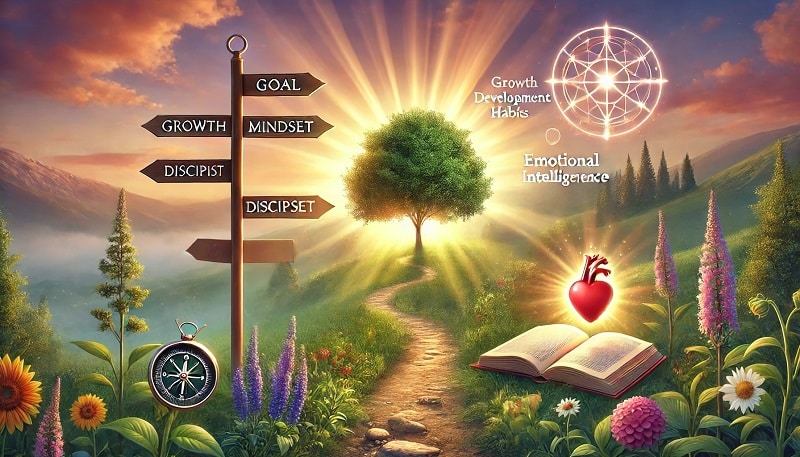Table of Contents
ToggleIntroduction Personal Development Habits
Personal Development Habits are the cornerstone of achieving meaningful, lasting transformation in every aspect of life. Whether it’s improving your health, advancing in your career, or fostering stronger relationships, cultivating consistent habits forms the foundation for growth. These habits shape the way you think, feel, and act, leading to the gradual development of a more empowered version of yourself. Understanding and implementing these habits is key to reaching your goals and maintaining positive changes over time.
Creating lasting change isn’t about short-term motivation but cultivating sustainable Personal Development Habits. These habits become ingrained in your daily routine, creating a ripple effect that touches every area of your life. As you strengthen your habits, you’ll see how they influence your decisions, relationships, and mindset. Personal development is gradual, but the results are long-lasting when you focus on forming the proper habits.
By implementing Personal Development Habits, individuals can transform their lives, achieving greater fulfillment and balance. These habits are about achieving success and building a foundation for mental, emotional, and physical well-being. This article will explore six essential habits that will help you create lasting change and lead you toward a more fulfilling life.
1. Setting Clear Goals
The first essential habit in personal development is setting clear and achievable goals. Goals provide direction and purpose, helping you focus on what truly matters. When setting goals, it’s essential to make them specific, measurable, achievable, relevant, and time-bound (SMART). This ensures your goals are realistic and attainable, keeping you motivated throughout the journey.
Having clear goals enables you to prioritize your time and energy efficiently. Without defined objectives, it’s easy to get distracted or overwhelmed by daily tasks. Regularly reviewing and adjusting your goals can keep you on track and ensure that you are continually moving forward. Goal-setting is the foundation upon which all other personal development habits are built.
2. Building a Growth Mindset
Adopting a growth mindset is crucial for personal development. This habit allows you to view challenges and setbacks as opportunities for growth rather than obstacles. With a growth mindset, you believe your abilities and intelligence can be developed through hard work and perseverance. This perspective encourages resilience and a willingness to take on new challenges.
Embracing a growth mindset fosters a love for learning and continuous improvement. This mindset helps you to stay open to feedback and new ideas, enabling personal growth in all areas of life. When you commit to developing a growth mindset, setbacks become stepping stones toward success rather than reasons to give up.
3. Practicing Self-Discipline
Self-discipline is a critical habit for achieving personal development. It involves the ability to control impulses, emotions, and actions to achieve long-term goals. Without self-discipline, even the most ambitious goals can fall by the wayside due to procrastination or distraction.
Developing self-discipline requires consistency and practice. You can start by setting small, manageable tasks for yourself and gradually building up to larger ones. Over time, self-discipline becomes a natural part of your routine, allowing you to stay focused and committed to your goals. The more you exercise self-discipline, the easier it becomes to make decisions that align with your personal development journey.
4. Cultivating Emotional Intelligence
Emotional intelligence (EI) is another essential habit in personal development. It refers to the ability to recognize, understand, and manage one’s emotions and those of others. High emotional intelligence allows one to navigate social interactions effectively, build stronger relationships, and manage stress in a healthy way.
Cultivating emotional intelligence begins with self-awareness, which involves being in tune with your own emotions and understanding how they affect your thoughts and behavior. It also includes empathy, which is the ability to understand and share the feelings of others. By improving your emotional intelligence, you can connect with others and handle difficult situations gracefully.
5. Practicing Gratitude
Gratitude is a powerful habit that can transform your outlook on life. When you regularly practice gratitude, you train your mind to focus on the positive aspects of life rather than dwelling on negativity. This shift in perspective can improve your mental health, increase your overall happiness, and enhance your relationships.
One way to cultivate gratitude is by keeping a daily gratitude journal, where you write down three things you are grateful for each day. This simple practice can shift your mindset from scarcity to abundance, allowing you to appreciate the small joys in life. Over time, practicing gratitude can lead to a more optimistic and fulfilling life.
6. Embracing Lifelong Learning
Lifelong learning is an essential habit for personal growth and development. The world constantly changes, and staying open to new information and experiences keeps you adaptable and relevant. Whether it’s through reading, taking courses, or learning new skills, lifelong learning helps you stay curious and engaged with the world around you.
Embracing lifelong learning also fosters a sense of accomplishment and personal satisfaction. It keeps your mind sharp and allows you to discover new passions and interests. By committing to learning throughout life, you expand your horizons and continue growing personally and professionally.
Conclusion
Personal Development Habits are the building blocks for achieving lasting change in your life. By incorporating these six essential habits—setting clear goals, building a growth mindset, practicing self-discipline, cultivating emotional intelligence, practicing gratitude, and embracing lifelong learning—you can create a strong foundation for personal growth. These habits enhance your overall well-being and empower you to overcome challenges and achieve your fullest potential.
Personal development is an ongoing process, and Personal Development Habits help you stay committed to that journey. These habits provide the tools and mindset needed to navigate life’s challenges with resilience and optimism. As you continue implementing these habits, you’ll find that personal development becomes a natural and rewarding part of your daily routine.
Ultimately, Personal Development Habits are about creating lasting change that impacts all areas of your life. By prioritizing these habits, you set yourself up for success, happiness, and fulfillment. Remember that personal development is not a destination but a lifelong journey, and these essential habits will guide you every step of the way.
Reference:







